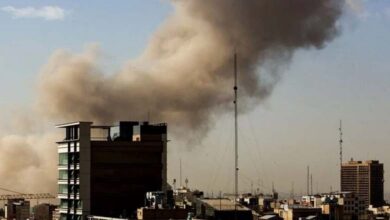Europe and Syria After al-Assad: “A New Political Beginning”

A high-level German visit to Damascus signals “a new political beginning” between Europe and the Arab country undergoing a challenging transitional period.
-
Turkey and Qatar Compete to Reap the Benefits of al-Assad’s Fall
-
Bashar Al-Assad: Details of the Final Days in Syria
These statements were made on Friday by German Foreign Minister Annalena Baerbock following her arrival in the Syrian capital, shortly after her French counterpart, Jean-Noël Barrot.
This visit by the two ministers marks the first of its kind at this level by Western officials to Syria since the fall of Bashar al-Assad’s regime.
Jean-Noël Barrot and Annalena Baerbock are scheduled to meet with the leader of the new Syrian administration, Ahmad al-Sharaa, according to the French Ministry of Foreign Affairs.
-
More than 7,000 Syrians in Jordan return to their country after al-Assad’s fall
-
Where Are Maher al-Assad and Ali Mamlouk Hiding? What Are Their Plans?
Meanwhile, EU foreign policy chief Kaja Kallas confirmed that the French and German ministers are representing the European Union during this visit and acting on its behalf.
Kallas added, “Our message to the new Syrian leadership is that respecting the principles agreed upon with regional parties is of utmost importance.”
“A New Political Beginning”
The German Foreign Minister stated, “My visit to Damascus is a signal of a new political beginning between Europe and Syria,” expressing Berlin’s desire for Syria to “rejoin the international community as a full member.”
-
Key Leaders of the “al-Assad Regime”: Where Are They Now?
-
Decoys and Fake Helicopters: New Details Emerge About al-Assad’s Escape from Syria
In a statement issued prior to her arrival in Damascus, the minister emphasized that Germany aims to assist Syria in becoming a “functional state fully controlling its territory.”
Baerbock, who will join her French counterpart in Syria, stressed that despite “doubts” about Hay’at Tahrir al-Sham, which leads a coalition of opposition factions that toppled Bashar al-Assad, “we must not miss the opportunity to support the Syrian people at this critical juncture.”
From the French embassy in Damascus, Barrot said, according to AFP, “Less than a month ago, a new hope emerged thanks to the mobilization of Syrian men and women. A hope for a sovereign, stable, and peaceful Syria,” adding that this hope is “real but fragile.”
-
Secret Turkish Deals with Russia and Iran Accelerated al-Assad’s fall
-
Russia Reduces Military Presence in Syria Following al-Assad’s fall
In a post on the X platform (formerly Twitter) on Friday, the French minister wrote: “Together, France and Germany stand alongside the Syrians, in all their diversity.”
He added that both countries aim to “strengthen a peaceful and effective transition to serve the Syrians and stabilize the region.”
The two ministers are also scheduled to visit Saidnaya Prison, located on the outskirts of the capital, before meeting Ahmad al-Sharaa.
-
The fall of Al-Assad Sparks Political Debate in Iran
-
The fall of al-Assad’s Regime: Will It Affect Russia’s Influence in the Region?
Recent Diplomatic Movements
In recent weeks, Syria has witnessed intense diplomatic activity, hosting numerous Arab and international delegations since al-Assad’s fall, ending the isolation imposed on it since the events of 2011.
On December 17, France had already sent envoys to the new authorities and raised its flag over its embassy, closed since 2012 in Damascus.
Germany, which also closed its embassy in 2012, sent envoys on the same day, aiming to establish contacts with the transitional authorities cautiously observed in their initial steps in power.
-
After Al-Assad’s Fall… Syria Closes Its Doors to the Houthis
-
“Bashar al-Assad’s Fall: The Map of Armed Groups Under the Banner of ‘Hay’at Tahrir al-Sham’”
Recent Context
In late November, armed factions led by Hay’at Tahrir al-Sham launched a surprise attack, taking control of major Syrian cities and entering Damascus at dawn on December 8.
Syrian President Bashar al-Assad fled the capital, ending more than five decades of his family’s rule.
-
Al-Assad’s Fall Weakens Iran but Doesn’t End Its Capabilities in the Middle East
-
Washington Warns al-Assad against Using Chemical Weapons in Response to His Defeats











